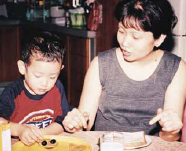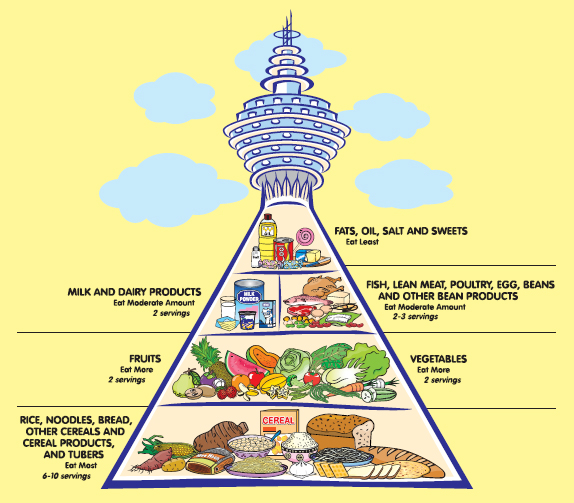Your child will grow most rapidly during the first 12 months of his life. During the first few weeks, his weight will increase by about 20-30 grams a day. By 1 year, he should be 3 times his birth weight and about 1.5 times his birth length.
Beyond two years, he should be putting on 2 to 3 kilograms per year, while height increases by 5 to 7.5 cm per year. All the while, his head would be growing, too, reaching its near-maximum circumference by about 2 years of age. This brain will achieve adult weight by the time he is 10.
Do not forget that his other body parts, such as his bones, teeth and muscles, are also growing.
His bones are growing longer and stronger, making him taller and his body proportions more mature. His muscles are growing and contributing to more of his body weight. By the time he is 5 years old, 35% of his body weight will come from his muscles.
His teeth will begin emerging at 6 months, which may cause some days of teething terror for your baby. Rest assured that the teething discomfort only occurs in the initial stage and will not accompany every tooth that emerges subsequently. Your child should have his entire set of baby teeth by the age of 2½ years. Between ages 6 and 14, permanent teeth will begin replacing his baby teeth.
OTHER CHANGES
Besides growing physically, your child will also be changing in other ways. As a baby, he used to rely on you almost completely to feed him, change him and carry him around. But because he is developing mentally, he is learning to do all that, and more, on his own. He will amaze you with his increasing abilities, including being able to comprehend, reason, make judgements and decisions, and solve problems. He will also be able to apply his previous experiences and lessons to current situations.
Your child progressively develops to become more independent. The four areas of development are ‘gross motor skills’, ‘fine motor skills’, ‘speech and language’ and ‘social adaptation’.

Gross motor skills involve movements of your child’s limbs to enable him to crawl, sit, walk and run. Fine motor skills relate to his ability to manipulate little things with his fingers, like picking up a pencil to draw, and other small, but purposeful, movements.
Your child’s speech begins with his cooing and babbling. He later develops language skills, which not only involves intelligible sounds, but also gestures, to communicate.
The last area is social adaptation, which is how your child learns to get along with other people. He moves from the thought that he is the centre of attention, to making friends and interacting with them. He learns about conversation, interaction, friendship, as well as likes and dislikes, and develops from a state of dependence to one of independence, and eventually interdependence.
THE RIGHT FOUNDATION
Stimulation in the first two years in the form of close family interaction, educational toys, communication and frequent conversation will help your child along. But they cannot substitute the need to provide him with the right nutrition to grow and develop to his full potential.

A nutritious diet is important because nutrients found in food give the body energy to carry out its ‘building’ activities. Food also provides other nutrients, like fibre, which help his body function well.
BEGIN WITH BREASTMILK
You can offer your child the right nutrition from the moment he is born. By breastfeeding your baby, you are giving him all the nutrients he needs in the right proportions.
Your milk also contains antibodies that protect him from infections and illnesses. You should breastfeed your baby exclusively from birth up to 6 months, even through the period when you introduce complementary foods to his diet.
Breastfeeding can still continue beyond 6 months, until your child is about 2. You do not have to stop breastfeeding even when you return to work. You can express your milk by hand, or with a breast pump, and refrigerate the milk in clean milk feeding bottles. Breast milk can be stored in the refrigerator for 24 hours. Unrefrigerated breast milk in our tropical climate should be used within 6 to 8 hours of expressing. While you are at work, the milk can be given to your child by a caregiver.
INTRODUCING COMPLEMENTARY FOODS
As your child grows older, he will not be able to rely on breast milk alone for all his nutrients. He may be ready for complementary foods (semi-solid and solid foods that are introduced to his diet) between 4 and 6 months.

You will need to provide him with a nutritious diet that meets all his nutrient requirements. Variety is the key. The food choices you make for your child now will play a role in shaping his food preferences for life, which will be evident later on. Giving him a variety of complementary foods will make it easier for him to accept a wider range of foods in toddlerhood and beyond. Where possible, avoid mashing different foods together; let him try each type of food one at a time, so that he learns to distinguish and like the taste that each provides.
PRE-SCHOOL EATING
Pre-school is a fun and active time for your child. At this age, he will need a lot of energy to grow, play and learn. You can give him a boost by providing him with a nutritious diet. At times, this will not be easy as pre-schoolers have quirky eating habits and unpredictable appetites.
Nevertheless, with the help of BRIGHT START Nutrition’s 13 nutrition guidelines, you can overcome these hurdles and keep providing your child with a healthy diet.
By providing right nutrition, you are endowing your child with the vitality of childhood. From this foundation, he will be able to take the next steps with confidence. When he does, be sure to go along for the ride, it’s bound to be an enjoyable one!
TODDLER & PRE-SCHOOL NUTRITION GUIDELINE
With healthy eating in mind, the Malaysian Paediatric Association supported the initiative of the Nutrition Society of Malaysia to develop the BRIGHT START Nutrition Guidelines. The 13 prime messages below will help you ensure the appropriate diet quality for your child.
- Provide a variety of wholesome and nutritious foods
Your child needs a variety of foods, to get all the nutrients that he needs. The best way to ensure this is to follow the recommendations of the Food Guide Pyramid. - Make rice, other cereals and cereal-based foods the main source of energy
Your child needs carbohydrate foods, such as cereals, grains, rice and tubers, to provide him with energy. Rice is a good choice, as it is the staple food of our country, and provides a lot of energy, while being low in fat. - Encourage more fruit and vegetable intake for vitamins and minerals
Fruits and vegetables contain vitamins and minerals, that help promote growth and development, build a healthy immune system and ensure overall well-being. They also contain dietary fibre, which helps prevent constipation. Children need both fruits and vegetables; one cannot substitute the other. - Give fish, lean meat, poultry, eggs, beans, bean products and pulses for protein
Protein is what your child’s body uses as building blocks so that he can grow. He needs a combination of animal and plant protein to meet the requirements. If your child cannot take animal protein (for religious or cultural reasons), give him a variety of beans, bean products and pulses. - Give milk, milk products and other calcium-rich foods daily
The healthy growth of your child’s bones and teeth depends very much on a mineral called calcium. The best source of calcium in your child’s diet is milk and dairy products. Other sources are fish with edible bones (e.g. sardines and anchovies/ikan bilis), and leafy green vegetables. - Give lean meat, poultry, fish, vegetables and other foods that are rich in iron daily to prevent deficiency
Iron deficiency is the most common nutritional deficiency among children worldwide. Your child needs iron from his foods, such as lean meat, poultry, liver and fish. Iron can also be obtained from cereals, fruits, vegetables and beans. Do not resort to giving him iron supplements, unless recommended by a doctor. - Fat is important; however excessive amounts should be avoided
Your child also needs appropriate amounts of fat in his diet to provide energy, fatty acids, and fat-soluble vitamins. Essential fatty acids are important for development of your child’s brain, nervous system and eyes. However, excessive intake of fatty foods can cause unhealthy weight gain in your child. This may lead him to grow into an overweight adult, and be exposed to the risk of diseases, like coronary heart disease, stroke, diabetes and some cancers. On the other hand, low-fat diets are not suitable for young children either. - Limit sweets, sweetened foods and sugary drinks; minimise salt intake
Children have a tendency to go for sweets and other sugary foods. These foods tend to be high in calories but usually contain very little nutrients. Too much of these foods could make your child overweight. Your child also does not require much salt in his diet. Too much of it may increase the risk of high blood pressure later on. - If snacking is required, give nutritious foods in small portions and at the right times
Your child may need snacks between mealtimes to keep him going. Be sure that these snacks are nutritious, not the size of regular meals, or too close to mealtimes. - Prepare foods that are hygienic and safe to eat
Your child is vulnerable to infections and illnesses that can be caused by contaminated food. Practise hygienic food preparation and storage to prevent your child from being afflicted with these infections. - Encourage physical activity for fitness and optimum development
Instead of watching TV or playing computer games all day long, your child should play and run around with his friends. This promotes his growth and development, increases his fitness, and lessens the risk of him gaining unhealthy weight. - Measure growth regularly to monitor health and nutritional status
Monitor your child’s growth regularly to see if he is growing at a healthy and normal rate when compared against internationally accepted growth charts. Ask your doctor for them or contact BRIGHT START Nutrition at Tel: (03) 5621 1408 for a set. - Make mealtimes an enjoyable family experience
At home, mealtimes are perfect for encouraging healthy eating habits. Children often love to imitate adults, so set a good example for your child by making healthy food choices for yourself. Mealtimes should be enjoyable and cheerful, so that your child will look forward to good times, eating with you and the rest of the family.






Comments